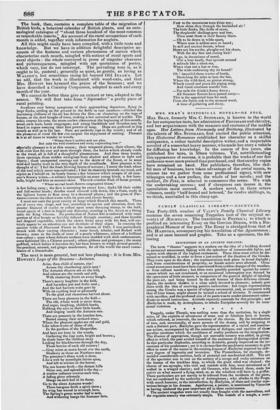FAMILY CLASSICAL LIBRARY—.ESCHYLUS.
THE Forty-fifth number of VALPY'S Family Classical Library contains the seven remaining Tragedies (out of the original se- venty) of iEscHyLus. The translation is POTTER'S; to which is prefixed an interesting Essay on the Grecian Drama, with a Bio- graphical Memoir of the poet. The Essay is abridged from that of Mr. HARFORD, accompanying his translation of the Agamemnon; and is at once learned and graphic. Take as a specimen, the fol- lowing
DESCRIPTION OF AN ANCIENT THEATRE.
The term "theatre" suggests to a modern car the idea of a building devoted to nocturnal amusement, blazing with the splendour of innumerable lights, and replete with objects of the highest excitement. These ideas must either be dis- missed or modified, in order to form a just notion of the theatres of the Greeks. They were open to the skies; the representations took place in broad daylight ; and, from considerations of propriety, no female actors were allowed. Occa- sional annoyance must have been experienced from sudden changes of the weather, or from radiant sunshine; but these were possibly guarded against by contri- vances which are not mentioned, or an occasional interruption was deemed by the spectators of little moment, in comparison of the general delight of inhaling the pure air, and being fanned by the soft breezes of their delicious climate. Again, the modern theatre is a scene solely devoted to pleasure; nobody goes there with the idea of receiving positive instruction : but tragic representation among the Greeks was a species of religious ceremonial, and, as compared with that of later times, might almost be termed a school of divinity. It commenced with sacrifice' and the professed aim of its poets was-to renderamusement subor- dinate to moral instruction. Aristotle expressly contends for this principle; and /Eschylus is made, by Aristophanes, to rebuke Euripides severely for its occa- sional violation.
* * S * * * *
Tragedy, under Thespis, was nothing more than the recitation, by a single. actor, of the exploits or adventures of some real or fabulous hero or heroes, which relieved, at intervals the monotony of the chorus. By the introduction of two, and, occasionally, of more persons of the drama, and by assigning to each a distinct part, s'Eschylus gave the representation of a varied and continu- ous action, accompanied by all the animation of dialogue, and excitive of those peculiar emotions which the semblance of reality produces on the imagination. The illusion of appropriate, though not moveable scenery was added, m giving effect to which the poet availed himself of the assistance of distinguished artists. In this particular Sophocles, according to Aristotle greatly improved on the in- ventions of his predecessor ; yet it is obvious that the machinery necessary to give effect to some of the scenes in the existing dramas of YEschylus required no ordi- nary degree of ingenuity and invention. The Prometheus, for example de- manded considerable exertion, both of pictorial and mechanical skill. The eye of the spectator was to rest on the scenery of a savage and rocky eminence on the bosom of the trackless deep, to which the giant rebel was chained : the chorus of sea-nymphs, who visit and condole with him were introduced as if wafted in a winged chariot ; and old Oceanus, who followed them, made his entrée on what seemed a flying steed, or, as the scholiast will have it, a griffin. These particulars are not merely to be inferred from the incidents of the piece, but are confirmed by the authority of Aristophanes ; who alludes in the Frogs, with much humour, to the introduction, by .Eschylus, of these and similar mys- terious beings in his dramas. Agatharcus, a painter, is mentioned by Vitruvies as having rendered the poet important aid in these contrivances.
The ancient tragedies were not usually thus fraught with the marvellous, and the requisite scenery was extremely simple. The outside of a temple, a man.-






















 Previous page
Previous page